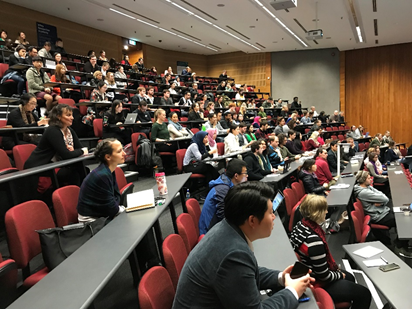early-career-researchers-and-librarians-swap-pain-points-and-share-ideas-on-advancing-research
March 18, 2015
I recently had the privilege of co-hosting a panel discussion with Chris Banks from Imperial College London at the Annual ASA conference which brought together both early career researchers and librarians. These young professionals shared some of the issues they face-as well as their viewpoints on what would make collaboration easier.This resulted in a lively conversation, so we thought we’d ask them to reflect on the discussion here.
Chris Banks, Panel Co-host and Director of Library Services, Central Library, Imperial College London:
Wiley’s Greta Boonen had the idea of bringing together early career researchers and young librarians with a request that they focus on their “pain points” in order to stimulate discussion. One of the presentations on day one set the scene nicely – the contribution by Monica Garcia Alloza. Monica described the tortuous process of getting from research to publication. With the heavily policy-driven open access agenda in the UK, I instantly understood why such “policy interventions” risk coming across to academics as the last straw in an already complex process. What interested me about our panel, particularly the two ECRs, is the mixed messaging that they get from departments/supervisors and from funders: on the one hand their funders may mandate publishing open access and yet on the other, publication in high impact journals is still perceived as key for progression. Open Access publishing can be quick, and therefore accrue citations quickly, but publishing in elite journals is coveted and still key to advancement. One of the organizers whispered in my ear afterwards “those two early career researchers made the most persuasive case for Open Access Publishing that I’ve ever heard”. I find myself asking “if we were inventing scholarly communications today, would we do it like this?”
Patricia Garcez, Panelist, Post-doc and soon-to-be Professor, Laboratório de Neuroplasticidade, Instituto de Ciências Biomédicas, Federal University of Rio de Janeiro:
As a final year postdoc, you can imagine how easy it was to discuss the challenges we face daily with respect to: how to publish quickly, how to get recognition as a peer-reviewer, and the dilemma of striving to get published in a high-impact publication while publishing fast enough to meet the fellowship funding time restrictions. We also talked about the role of editors, the advantages of open access, the role of co- authors in a manuscript and how publishers can help the early career scientist (ECS). This last topic really resonated with me because I believe that the quality of science would improve if early career scientists had more opportunities to visit and collaborate with colleagues abroad or to attend international meetings. Publishers could assist this process by promoting mobility grants for this purpose. This session provided a unique opportunity to interact and exchange perspectives with various professionals from the world of scholarly communications such as librarians and publishers. It feels good to be part of a broad community that ultimately shares the same goal: to promote quality and the advancement of science.
Gavin Phillips, Panelist and Principal Library Assistant (Acquisitions and Metadata) at Imperial College, London:
As a librarian dealing with e-books, and particularly non-subscription e-books, the world of publishing looks incredibly complex with a lack of easily manageable information. For those titles that can be licensed institutionally, there are a plethora of considerations relating to platforms, formats, accessibility, pricing models, and the dreaded Digital Rights Management. Alarming increases in price or decreases in functionality then create a need for reconsideration at surprising intervals. Add to this the fact that there is no single place to find all (or even most) of this information! The result, in addition to dissatisfied library users, is that the expertise to navigate this landscape often resides in the head of a single member of library staff who then needs to constantly update that knowledge.
The obvious way to attempt to address this is to increase engagement between librarians and publishers but that is easier said than done. The onus shouldn’t necessarily be on publishers to achieve this and perhaps librarians need to work collaboratively to represent their users with a single, louder voice.
The possible answers might be as complex as the question but could there be a role here for intermediaries to make sense of it all? To what degree could the extra cost to the library be offset against more efficient acquisition processes? Most importantly, would this add value for libraries by better enabling acquisitions teams to source the best content for users?
Dave Daversa, Panelist and PhD Candidate, Evolutionary Ecology Group, University of Cambridge Institute of Zoology, Zoological Society of London:
To an early career researcher like myself, the relationship between scientists and the publishers of their work can appear either one-sided or non-existent. We can feel at the mercy of publishers for professional rises in status. Yet, the ASA conference changed my perspective on the scientist-publisher relationship. I felt I was on equal ground, as publishers reached out to me with genuine interest in understanding the challenges young researchers face. Publishers are providing us researchers with a valuable service. I became enlightened of a capacity to influence how these services are provided so that productivity is maximized.
This conference also introduced me to a strong group of concerned librarians. Once again, the relationship that we researchers expect to have with our librarians is minimal, particularly in the process of publishing. This conference also demonstrated that libraries have the potential to play an active role in the publishing process.
We are experiencing a time of transition in the world of scholarly publications. Open access is on the rise, budgets are becoming constrained, and publishing demand is ever-increasing. Academic researchers, publishing agents, and library systems are all directly affected by this change. To ensure that this transition proceeds in a positive direction, each of these stakeholders must strengthen their relationships with one another. Open lines of communication must be perpetually maintained. This year’s ASA meeting embodied this practice. The progress that was achieved at the meeting illustrates the power of the interdisciplinary exchange of ideas.
Klara Finnimore, Panelist and Subscriptions and Access Officer, Library Services, King’s College London
I chose to raise some points that are pertinent to the daily work for my team, and although they were not necessarily all unknown issues, I felt it was important to acknowledge that the publishing and subscription agent community would still benefit from being reminded of some common issues. These include the continuing need to push for off-campus authentification and simplification of the user journey. Users want to be able to access content from anywhere and they don’t expect a different service whether they are on or off campus. Anything publishers or librarians can do to help achieve this goal of seamless access is very valuable. Additionally, I touched upon the need for user-friendly mobile access, and clarity over what is accessible in open access and hybrid open access journals.
I learned a lot from participating in the session, not least of which was the value of encouraging open communication between different sections of the scholarly community. I also gained an insight into the needs of researchers which helps me in my role as a librarian; and I enjoyed making new connections within my industry.
Many thanks to our panelists for their contributions!
Patricia and Dave are members of Wiley Advisors, a program for early career researchers and professionals to serve as a voice for their communities. For more information, please visit Wiley Advisors online or on twitter @WileyAdvisors.
Image Credit/Source:Rawpixel/Shutterstock



